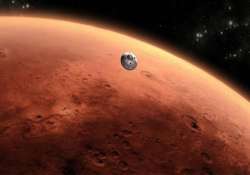Can space radiation derail manned Mars mission?
Washington: What would threaten astronauts who are part of a manned mission to the red planet the most? Space radiation.According to a study, astronauts on the International Space Station (ISS) receive medications against such cosmic

Washington: What would threaten astronauts who are part of a manned mission to the red planet the most? Space radiation.
According to a study, astronauts on the International Space Station (ISS) receive medications against such cosmic ray radiation that exceed their lifetime limits after just 18 months for women and two years for men.
In case of a Mars mission, a reality in next two decades, astronauts would spend at least this long in the harsh radiation of deep space.
“The tumours that cosmic radiation make are more aggressive than what we get from other radiation,” Francis Cucinotta, a radiation expert at University of Nevada, Las Vegas, was quoted as saying.
He has recommended that NASA gather far more data about the health risks their astronauts are exposed to.
Astronauts are exposed to galactic cosmic rays.
If they hit an important cellular structure like DNA, they can generate mutations.
Because they move so fast, galactic cosmic rays can not be stopped much by shielding, said the authors in a report published in the journal PLoS One.
According to the report published in LiveScience, “one way to reduce astronauts' exposure to galactic cosmic rays could be to send them to space only during the peak of the sun's natural 11-year solar cycle”.
According to a study, astronauts on the International Space Station (ISS) receive medications against such cosmic ray radiation that exceed their lifetime limits after just 18 months for women and two years for men.
In case of a Mars mission, a reality in next two decades, astronauts would spend at least this long in the harsh radiation of deep space.
“The tumours that cosmic radiation make are more aggressive than what we get from other radiation,” Francis Cucinotta, a radiation expert at University of Nevada, Las Vegas, was quoted as saying.
He has recommended that NASA gather far more data about the health risks their astronauts are exposed to.
Astronauts are exposed to galactic cosmic rays.
If they hit an important cellular structure like DNA, they can generate mutations.
Because they move so fast, galactic cosmic rays can not be stopped much by shielding, said the authors in a report published in the journal PLoS One.
According to the report published in LiveScience, “one way to reduce astronauts' exposure to galactic cosmic rays could be to send them to space only during the peak of the sun's natural 11-year solar cycle”.